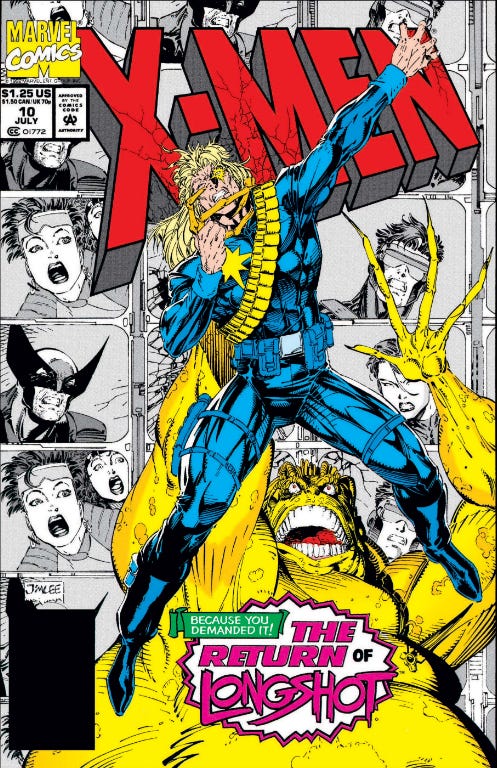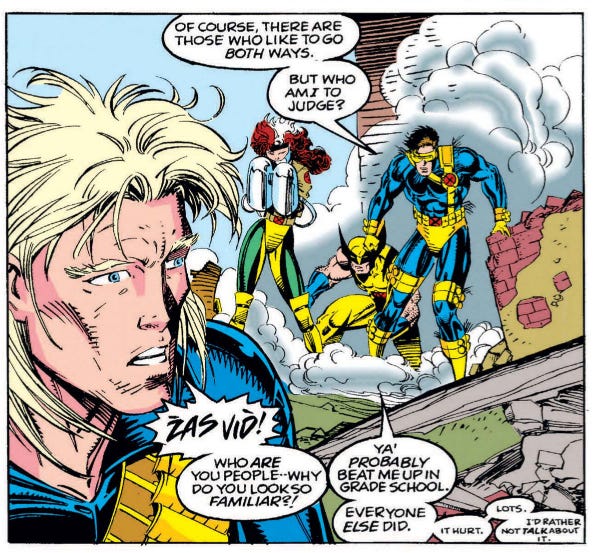I spend a lot of time on my phone angrily replying everyone on X-Twitter who hates Mojo. My psychiatrist has told me this is not good for my mental health and well-being and my energy would be better spent volunteering for a charity or tending to my relationship with my wife, but I can’t help it. I feel compelled to let the entire world know that Mojo is not a bad X-Men villain, simply a misunderstood one, by forcibly correcting each and every person who brings it up, one random stranger at a time, via the internet. I would say it takes up about 70% of my day.
The reality is, I get why people don’t like Mojo. With his obnoxious personality, his impossibly dense mythology and multiple layers of irony, Mojo wasn’t really built for this world. The 1985 Longshot miniseries that introduced him, the titular hero, Spiral, and the whole gang, don’t really feel like part of the Marvel Universe despite being set there: it’s a project that is rich in satire and social commentary was was deliberately, provocatively, weird.
The problem was, Ann Nocenti, who wrote the series, was Chris Claremont’s editor on X-Men at the time, and Chris’ philosophy was more or less, “If I like it, it goes in,” which is how the X-Men ended up mingling with Roma and Saturnyne, and all this other stuff.
So Longshot joined the X-Men (where he was never a good fit, in my considered opinion) and the Mojoverse stable of characters became recurring antagonists for them. Spiral even joined the Freedom Force! And though the X-Men’s clashes with Mojo initially did keep that satirical spirit alive — I would argue that X-Men Annual #10 does a good job balancing Mojo’s function as social commentary against the need to have him be a big bad comic book villain — the longer he’s around the more over-exposed he’s likely to become. Superhero comics are mostly earnest and unironic and dare I say serious business, and have a need for things to make sense, so when Mojo’s “mythos,” as it were, started to take root, there was a need for writers — and Claremont isn’t innocent of this either — to integrate it and make sense of it and try to use it to drive stories.
So for the last little while we’ve seen snippets of Longshot as the freedom fighter on Mojoworld, desperately trying to win liberation for the oppressed masses. My heart goes out, truly it does, but it’s impossible to take as seriously.
Instead of being satire aimed at the X-Men’s currently fractious behind-the-scenes existence, it’s just a bog-standard supervillain battle skinned as a ha-ha-larious send-up of the Wizard of Oz (for a grand total of about three pages.) Comics don’t do satire great, but they do often do parody well… but this is not it. Scott Lobdell can make things funny and lighthearted, but I wouldn’t say he exhibits a biting wit here.
If there’s one thing I hate, it’s forced fun. I love the glorious straight-faced weirdness of X-Men normally, but when it’s time to do something silly on purpose, you can see the flopsweat on the book’s brow as it realizes the “tight five” it thought it had was really more one quip and a lot of build.
And thus is the dilemma of Mojo. The truth is, he works best outside of the context of the usual monthly adventures of the X-Men — don’t ask me why, but there’s something about the X-Men’s ongoing plight and his deal that doesn’t quite mix, but when you’re doing an Annual or some other kind of silly one-shot, that gives you the perfect pretense to shift gears. He’s not meant to be in the constellation of the X-Men’s usual villains like Sinister, Apocalypse, Stryfe and Trevor Fitzroy.
The best use of Mojo was in the X-Men cartoon, where “something completely different” works well on a Saturday morning, and the writers had a ball doing all the kooky TV references that are part and parcel of his appearances. Plus he was voiced enthusiastically by Peter Wildman of the Frantics.
Over in Uncanny X-Men, (which goes up on Monday despite me talking about it second) we’re finishing up the stirring story of Iceman’s battle with the Cyburai and the cliffhanger of Storm’s answer to Forge’s proposal. It’s a shockingly minor issue, but even if I don’t love it, I respect how it’s about the X-Men as characters, and that the fighting is a little secondary because of that.
Things are going to get rougher before they get better for the X-Men comics, as superstar creators Jim Lee and Whilce Portacio — who were the source of the schism between editor Bob Harras and Chris Claremont in the first place1 -- are departing to found Image comics with five top Marvel artists, meaning the creative teams are shifting yet again as Scott Lobdell takes on the plot responsibility in Uncanny and a new writer comes on board in the other title to balance things out.
But that’s for the future. We’ll see you Monday and Thursday on Uncanny X-Cerpts!
Honestly, it was never going to work out; it’s clear Harras wanted to simplify the X-Men’s presentation and it was only getting weirder and more complicated under Claremont, and Lee and Portacio just happened to be golden geese whose presence could justify ousting the longtime writer. Of course, it ended up only getting weirder and more complicated anyway, but that’s a story for another time.








